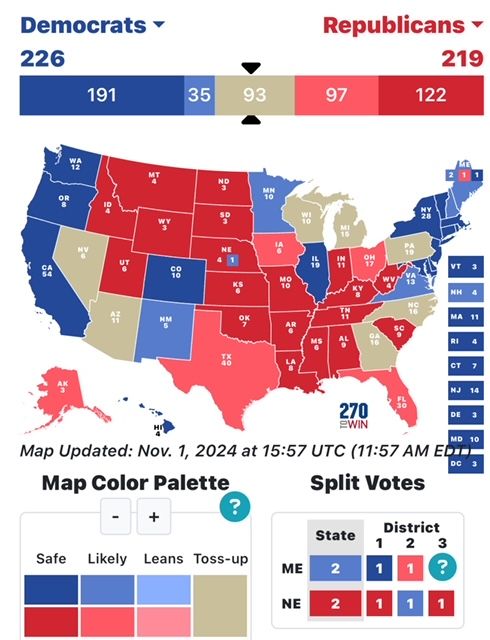
VOTE VOTE VOTE
Enhancing the Understanding of the Current Political Landscape
Stay Informed and Engaged with the Latest Political Updates
Consider This:
We have only two days remaining before the presidential election. We cannot overstate the importance of this election. Your vote will determine who we put in the White House and what party controls the congress.
Although, the voter turnout rate for the 2020 U.S. presidential election was about 66.8% of the eligible voting population which was the highest rate of voter turnout for a presidential election in the United States since 1900, we must strive for a higher turnout.
Voter turnout significantly influences the outcome of presidential elections by determining which demographic groups have the most influence in electing a candidate. Key effects of voter turnout on presidential elections include:
1. Swing States: High or low turnout in swing states can tip the balance in these critical areas, often deciding the overall election outcome due to the Electoral College system.
2. Demographic Influence: Turnout rates among different demographic groups (e.g., age, race, education) can shift the election results. For instance, higher turnout among younger voters or minority groups can favor certain candidates.
3. Policy Priorities: Candidates may focus on issues important to high-turnout groups, affecting campaign strategies and policy proposals.
4. Mandate for Change: High turnout can suggest a strong public desire for change or support for the status quo, influencing the political agenda and public policy after the election.
Overall, voter turnout can alter the political landscape by determining which voices are heard and which policies are prioritized.
Notable American figures have strongly encouraged voting and emphasized its importance in the democratic process. Do not let their efforts be in vain, VOTE. Some of these luminaries include:
1. Martin Luther King Jr.: He advocated for voting rights during the Civil Rights Movement, highlighting its role in achieving equality and justice.
2. Susan B. Anthony: A key figure in the women’s suffrage movement, she fought tirelessly for women’s right to vote, believing it was crucial for gender equality.
3. Franklin D. Roosevelt: The 32nd President emphasized the importance of voting as a means for citizens to express their sovereignty and influence government policies.
4. John Lewis: A civil rights leader and Congressman, he was a staunch advocate for voting rights, famously stating, “The vote is precious. It is almost sacred.”
5. Thomas Jefferson: One of the Founding Fathers, he underscored the necessity of an informed and active electorate for the success of the republic.
These individuals have all contributed to the ongoing dialogue about the significance of voting in maintaining a healthy and vibrant democracy.
Furthermore, throughout American history, several groups have fought for voting rights to ensure that all citizens have a voice in the democratic process. Do not let their efforts be in vain, VOTE. Key groups include:
1. Suffragists: Led by figures like Susan B. Anthony and Elizabeth Cady Stanton, they fought for women’s right to vote, culminating in the 19th Amendment in 1920.
2. Civil Rights Movement: Activists like Martin Luther King Jr. and organizations such as the NAACP worked to secure voting rights for African Americans, leading to the Voting Rights Act of 1965.
3. Native American Activists: Groups and leaders like the National Congress of American Indians have worked to secure and protect voting rights for Native Americans, facing legal and logistical barriers.
4. Latino Rights Activists: Organizations such as the League of United Latin American Citizens (LULAC) have advocated for the voting rights of Hispanic and Latino communities.
5. Disability Rights Groups: Advocates have worked to ensure accessible voting for individuals with disabilities, leading to legislation like the Americans with Disabilities Act (ADA).
These groups have been instrumental in expanding and protecting voting rights for various marginalized communities.
Please remember the democratic process, which your voice supports, guards against tyranny through several key mechanisms designed to ensure accountability, representation, and the protection of individual rights:
1. Separation of Powers: By dividing government into executive, legislative, and judicial branches, democracy prevents any single entity from gaining too much power, ensuring checks and balances.
2. Free and Fair Elections: Regular elections allow citizens to choose their leaders, providing an opportunity to remove those who abuse power or do not represent the people’s interests.
3. Rule of Law: Democracy is grounded in the rule of law, where laws apply equally to all, including those in power, preventing arbitrary use of authority.
4. Constitutional Protections: Constitutions often enshrine rights and freedoms that protect individuals from government overreach, such as freedom of speech, assembly, and the press.
5. Civil Society and Media: A vibrant civil society and independent media can hold government accountable, exposing abuses and mobilizing public opinion against tyranny.
These elements work together to maintain a system that respects individual freedoms and limits the potential for authoritarianism.
To my friends, acquaintances and all who have taken the time to read this BLOG, thank you. I hope that you found it informative. I hope that it inspired you to vote your conscious. Your voice will determine the way forward for our country, our home.
Who is ahead in the National polls?

2024 Presidential Election Interactive Map

Reference List
Assist Guru. (2024, October). Personal communication
Who is ahead in the national polls? (3 November, 2024) https://projects.fivethirtyeight.com/polls/president-general/2024/national/
2024 Presidential Election Interactive Map (3 November, 2024)https://projects.fivethirtyeight.com/polls/president-general/2024/national
COUNT DOWN UNTIL THE PRESIDENTIAL ELECTION